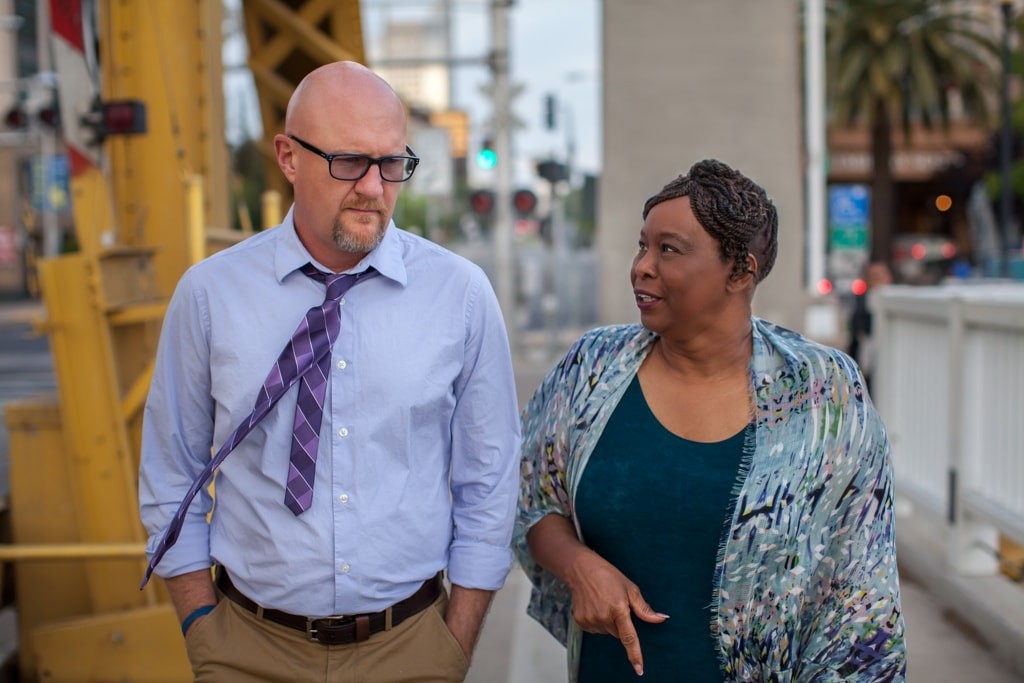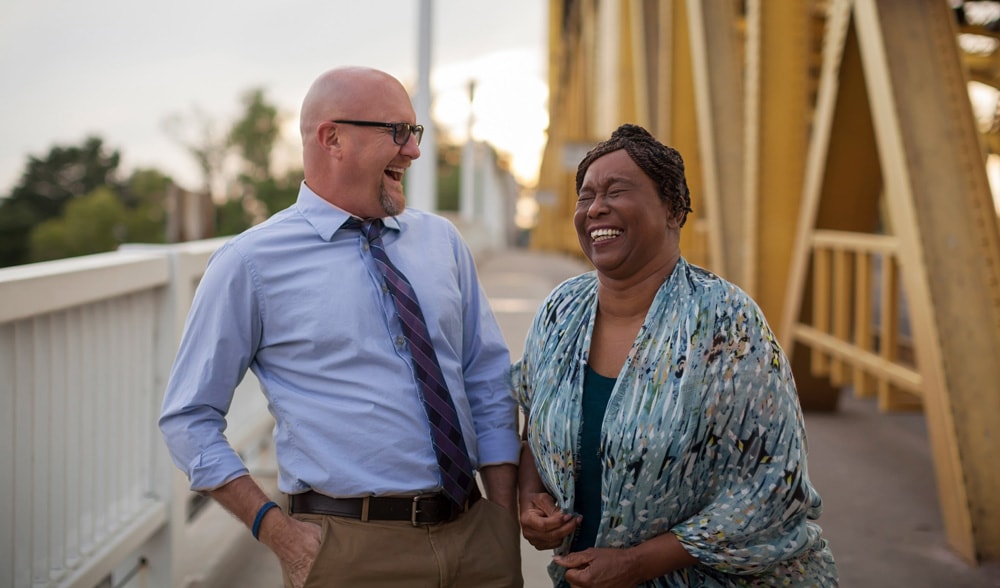
Shortly after its inception in 1839, the city of Sacramento exploded with the discovery of something shiny in the silt-filled waters of a sawmill. Prospectors came by the thousands, people looking for a fresh start or a quick buck in the Wild West. The Gold Rush also brought the attention of Christians concerned with the lawless nature of a town full of the newly and hoping-to-be-newly rich. Pastors began preaching in a grove of oak trees by the Sacramento River, the vital artery of the region, to welcome prospectors with the Good News. These quite literally trailblazing church planters and preachers formed a core of believers who coupled faith and works in a city riddled with disease and destitution. They spoke openly—passionately—against the racist treatment of Chinese immigrants, black migrants, and other disenfranchised groups, and advocated against California becoming a slave state. Though from Baptist, Episcopalian, Methodist, and other traditions, these pioneering “founding fathers” looked past their differences for the sake of establishing the spiritual life of Sacramento. Bucking any traditional frameworks for ministry, these colaborers, these friends, did something revolutionary by that river.
Fast forward 150 years, and two contemporary cross-denominational pastors form a similarly revolutionary partnership in the stream of Sacramento’s religious heritage. Joy Johnson, a black woman from the Baptist tradition, came to Sacramento barely out of adolescence. Bret Widman [DMin ’12], a white man from the Evangelical Covenant denomination, made the move to California’s capital five years ago after working in a variety of ministries in the United States. Joy is a graduate from a seminary specializing in African American church traditions. Bret graduated from a more traditional seminary. Joy created and runs a nontraditional ministry for the underserved families of an apartment complex. Bret now leads a multiethnic neighborhood church. Despite their differences, these two share much—the same significant spiritual mentor, the same praise leader, a loud and infectious habit of laughter, and a love for the city of Sacramento.
Marked from an early age by her natural gifts in leadership, Joy was content serving faithfully in the background of the church, ignoring a still, small voice that said she was born for something more visible—an unfortunate reality for many women reared in ministries lacking an abundance of female leaders. Fortunately, that still, small voice also had flesh and bone in the person of Bishop Sherwood Carthen, an influential African American leader in Sacramento. With his persistent prodding for over 15 years, Joy finally embraced her gifts and the future that they implied. From that point of recognition, it was a fast track for her from seminary to ordination to church leadership—all under the care of her unshakable mentor.
The rails of Bret’s ministry were greased in a way that Joy’s were not, though he, too, had to cross many borderlines to complete his journey to Sacramento. From seminary to church leadership to teaching, Bret came to California’s Central Valley by way of Oakland and Chicago and Canada before docking at River Life Community Church in Sacramento as lead pastor in 2010. He also found a meaningful relationship with Bishop Carthen, who served as the vital bridge between him and Joy. When looking back on the influence of their shared mentor, Bret muses, “I’m still trying to figure out why Sherwood invested in me. I only knew him for five years, and I still can’t figure out why I got grabbed by the back of the neck!”
Back then, in 2012, Bishop Carthen was coleading one of Fuller’s Micah Groups for local preachers and invited Joy and Bret to join. Though each was reluctant to add yet another commitment to their busy schedules, they both took his invitation seriously and showed up at the first meeting in February. And much like those founding pastors by the river 150 years prior, Joy recalls discovering her diverse brothers and sisters in a way that was undeniably appealing. “A lot of times pastors run past each other on the surface for years and never really peel into the backstory, the commonalities, and the things that we share.”
Brad Howell, director of Fuller Sacramento and witness to Bret and Joy’s friendship, reflects on the purpose of the Micah Groups. “Unless we are intentional, we can all be serving the kingdom, but our efforts are fragmented from each other. The Micah Groups flip this paradigm.” Designed as formation groups for preachers through Fuller’s Ogilvie Institute, the Micah group dictum of seeking justice, loving mercy, and walking humbly with God shifted Joy and Bret’s learning paradigm from note-taking to community-building, “working on preachers instead of on preaching,” Bret recalls.

Naturally then, over time, as the Micah members grew in relationship, barriers shrank. One Sunday Joy would load up her congregation into minivans and cross town to preach at Bret’s church. Another weekend Bret would teach at a cohort member’s Korean church retreat. It wasn’t always easy, but it was formative. “The group took us into conversations that were awkward, that were challenging, that were uncomfortable, that I really did not expect. I can’t tell you how many times I left there thinking, ‘Next meeting I’m not coming back!’” recalls Joy. “But I know we would not be who we are today except that our Micah Group provided us with the opportunity to walk through the most devastating places of loss that I could even imagine.”
One of those unimaginable losses was the sudden passing of Bishop Carthen in 2013. Leaving a void in both the Micah Group and the leadership of Sacramento, his loss sent Joy and Bret reeling, bringing them even closer together. Because of the friendship they had built, they were able to share their grief on common ground. Bret recalls, “I remember Joy saying, ‘nobody is going to step into his shoes because they’re too big, and it’s going to have to be many of us that do that.’ Those words landed for me.” Bret was reminded of the story that Carthen shared with him about the spiritual birth of Sacramento, of the pastors who partnered together along that great muddy river, and Bret knew it was a vision he had to share with Joy and the rest of his Micah Group. It quickly galvanized Joy and Bret with a confirmation that they were on a course that their beloved mentor had charted for them. That didn’t make it easy, but it confirmed that it was right.
Navigating the turbulence of race and reconciliation has been and still is a significant issue in Sacramento as it is across the nation. Bret and Joy have chosen, though, to build their bridges together. When the Ferguson verdict was announced in November 2014, Joy instinctively withdrew to mourn and grieve in private, but the by-then-completed Micah Group turned to her for leadership. White and black friends felt adrift facing such a tumultuous season. They told her, “We don’t know how to think about this until we sit in your space and hear from you. We need to know what you’re experiencing.” Without the friendships started in Micah, those leaders would be missing a critical member of the conversation.
Recently, walking on the mustard-yellow Tower Bridge that spans the brown waters of the Sacramento River and reflecting on Ferguson, on Treyvon Martin, on the fractured nation, questions surface for Joy and Bret: Have we progressed in the past 150 years? Fallen back? How can we heal as a nation if the very relationship between black and white was birthed in the curse of slavery? It is there that Bret returns to the image of those Wild West mavericks preaching on the banks of the very same river. He remembers sharing the story of Sacramento’s early religious life with a fellow community leader. That friend told Bret that, unlike other regions of America’s divided past, “It was good here at one point.” Charleston, Selma, Birmingham: there the path is different. There, the friend continues, “you have to start. You have to build.”
As Bret and Joy stand together on that bridge, the symbolism is not lost on them. “The thing that is hitting us so hard right now is we don’t see one another as human,” says Joy. “I don’t see you in my world. I’m not worshiping with you, I’m not talking with you. I might talk past you. I’ll see you at the grocery store, maybe pass by you in the movies, but I’m not talking with you. You’re not dwelling with me, you’re not sitting in my space. And the bigger thing is you’re not weeping with me, or suffering when I suffer.” Relationships, they agree, are the key.
For Joy and Bret, Micah Groups formed the foundation of the bridge that connected the space between them. Spanning comfort zones and preferences, their kinship is evident to anyone who spends more than a few minutes in conversation with them. But it isn’t just happenstance. Mining towns don’t become state capitals by happenstance. Planks don’t become bridges by happenstance. Intent, collaboration, and perseverance build safe passage over troubled waters. Joy and Bret know that. They are ready to lead people across together.



